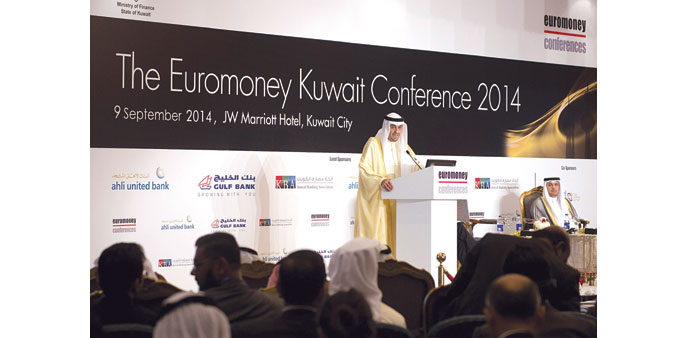Al-Saleh speaks at the opening of the Euromoney Conference in Kuwait City yesterday. Kuwait is suspending a programme under which foreign winners of big government contracts are required to invest in the local economy, Saleh said, as the country tries to attract more overseas companies to the Gulf state.
Reuters
Kuwait City
Kuwait has suspended a programme under which foreign winners of big government contracts are required to invest in the local economy, its finance minister said yesterday, as it tries to attract more overseas companies to the Gulf state.
“It has been frozen temporarily. We need to revise it,” Anas al-Saleh told Reuters, adding that many international businesses firms had been critical of the scheme.
“This is why we’ve frozen it to make sure it is not an obstacle for those firms to come in.”
He said that new rules could be ready in about six months.
One foreign businessman said he was delighted with the news, saying that the programme’s red tape discouraged companies from doing business in one of the world’s richest countries on a per capita basis.
Once seen as a Middle East trailblazer, Kuwait’s economy has lagged behind more dynamic trade hubs such as Doha and Dubai.
Kuwait’s leaders point to political deadlock in parliament that makes it difficult to approve large projects involving foreign investment. But many observers say that the government’s frequent personnel changes and layers of bureaucracy are also to blame.
The so-called offset programme was introduced in 1992 as a way of weaning Kuwait off its reliance on oil and foreign manpower, giving it access to new technologies and training.
Offset obligations apply to military contracts of a value equal to or above 3mn Kuwaiti dinars ($10.5mn), civil/government contracts of a value equal to or above 10mn dinars and downstream oil/gas contracts.
Foreign suppliers must invest 35% of the contract value in an approved offset business venture, according to the website of the Kuwait Direct Investment Promotion Authority.
Unlike offset arrangements in Saudi Arabia and the UAE, which have tended to be limited to military contracts, Kuwait’s programme applies also to civilian contracts signed with Kuwaiti government entities.
Diplomats say the suspension disclosed by the minister affected both defence and civil contracts. Critics of the scheme said it favoured multinational companies able to absorb offset costs by using economies of scale and that it required smaller exporters to divert precious management resources.
“We need to revise it and then, later on, implement it in a more moderate way, which we believe will help inviting those international firms,” the minister said.
“I wouldn’t see more than six months,” Saleh said when asked when the new rules would be ready.
Part of an organisation’s offset obligation can be fulfilled through the purchase of goods and services of Kuwaiti national origin, according to a 2010 study by the National Bank of Kuwait. But these purchases should not be related to the supply contract that is initially subject to the scheme.

